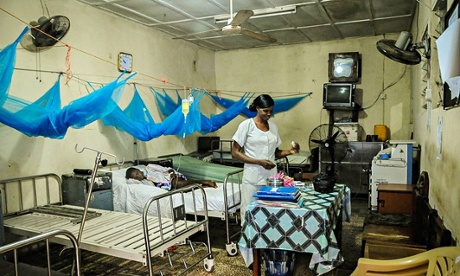
The Ebola epidemic that has so far killed more than 2,200 people in west Africa was an “avoidable tragedy” that underlines the vital need for Britain and other international donors to spend more on strengthening health systems in developing countries, an influential group of UK MPs has warned.
In a blunt report published on Friday, the Commons International Development Committee urged Britain’s Department for International Development (DfID) to place greater emphasis on building up weak health systems and to draw on the medical and managerial expertise of the NHS in doing so.
“The devastating ongoing Ebola epidemic in west Africa has served to emphasise the importance of establishing strong health systems,” it said. “The apparent hesitancy and lack of coordination in the international response suggest that the global health system and emergency plans have failed.”
While the committee described DfID as a “world-leader” in strengthening health systems, it said it feared the department’s “target-driven mentality”. It added that work with large international partnerships whose focus is on getting rapid results by concentrating on specific, high-profile diseases had come at the expense of shoreing up health infrastructures in poorer countries.
According to the report, DfID spent £360m on supporting health systems and £10m on health systems research in 2013-14. Over the same period, it provided £387m to the Global Alliance for Vaccines and Immunisation (Gavi); £543m to the Global Fund to Fight Aids, tuberculosis and malaria, and £53m to Unitaid, the international organisation created to increase the supply of affordable medicines to the developing world.
“DFID has a good record on health but relies on international partners such as the Global Fund and the vaccine alliance, to spend an ever-greater proportion of the UK aid budget,” said the committee’s chairman, Sir Malcolm Bruce. “To date these organisations have successfully delivered significant ‘quick wins’ by targeting specific diseases Aids, Malaria and TB.”
Bruce said the department needed to review its funding arrangements to ensure that UK aid money was being used to build stronger health systems, adding: “It must also be prepared to withhold funds from organisations unwilling to take this approach.”
The committee recommended that DfID become a “more vocal champion of health system strengthening on the world stage”. This could be achieved by publishing more figures about its spending and performance - and by encouraging others to follow suit, it said.
Another of the report’s key suggestions was that the department make proper use of the skills and knowledge on its own doorstep. “For all the domestic criticism it gets, the NHS is internationally recognised as one of the best health systems in the world,” said Bruce. “Yet DfID only makes modest use of the considerable expertise that resides within the NHS.”
The committee said the NHS had much to offer in both human and institutional expertise. Not only would encouraging more UK medical staff to volunteer overseas help share knowledge and skills, it would also benefit the NHS by building global contacts. Similarly, argued the committee, NHS administrative staff could offer advice on finance and management while also learning “to tackle familiar problems in unfamiliar settings”.
Bruce said that lessons had to be learnt from the Ebola epidemic, which has spread through Guinea, Liberia, Sierra Leone and Nigeria.
It was, he said, “an avoidable tragedy that has served as a devastating reminder for what happens when health systems are weak”.
A DfID spokesperson said: “DfID is a world leader in supporting developing countries to strengthen their health systems, improving facilities, management, staffing and access to supplies. The Ebola crisis demonstrates the vital importance of a fully functioning health system and the UK will continue to help affected countries to respond to the outbreak.
More than £25m of British funding is supporting the global effort to contain Ebola, which also includes providing medical supplies, funding vaccine trials. In addition, British military and humanitarian experts will set up a medical treatment facility in Sierra Leone.”
International health agencies have been accused of responding far too slowly to Ebola. A month ago, Joanne Liu, international president of the medical charity Médecins Sans Frontières, criticised the World Health Organisation for not declaring the outbreak an international public health emergency until 8 August, adding: “I think the wake-up call was too late.”
On Wednesday, the Bill and Melinda Gates Foundation announced that it would spend $50m (£31m) to support the emergency response to the outbreak.











